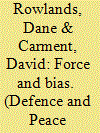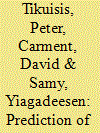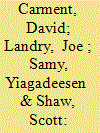|
|
|
Sort Order |
|
|
|
Items / Page
|
|
|
|
|
|
|
| Srl | Item |
| 1 |
ID:
073783


|
|
|
|
|
| Publication |
2006.
|
| Summary/Abstract |
Throughout the 1990s multilateral interventions often deviated significantly from traditional peacekeeping in terms of mandate complexity, level of force, and the absence of consent and impartiality. This paper develops a formal model of biased intervention and specifies propositions regarding its effects on combatant behaviour. We find that the response to the intervener depends on the how the combatants divide their labour resources between production and fighting, the amount of resources the intervener transfers between the combatants, and the degree to which the intervener's military efforts affect the effectiveness of the combatant's military forces. NATO's intervention in Kosovo is then used as a case study to illustrate the strengths and weaknesses of the model. Finally, we identify the theoretical and policy?relevant implications of the model and outline directions for future research.
|
|
|
|
|
|
|
|
|
|
|
|
|
|
|
|
| 2 |
ID:
087338


|
|
|
|
|
| Publication |
2009.
|
| Summary/Abstract |
The purpose of this review is to identify a framework for understanding the internationalization of ethnic conflict. We examine three approaches that purport to explain escalation-namely extension, interaction, and transformation-and emphasize the fact that each theory by itself lacks full explanatory power. Synthesis that focuses on factors from state and society, which shape the decision to become involved in ethnic strife is essential. Examination of the preceding factors reveals that institutional configurations and ethnic composition indeed do limit future options available to states and influence the distribution of capabilities among leaders of groups. The main conclusion of this essay is that ethnic diversity in a society and high constraint on state action are optimal conditions for overcoming insecurity.
|
|
|
|
|
|
|
|
|
|
|
|
|
|
|
|
| 3 |
ID:
119957


|
|
|
|
|
| Publication |
2013.
|
| Summary/Abstract |
The primary objective of this article is to advance the development of early warning of intrastate conflict by combining country-level structural and events data in a logistic regression model calibrated and validated using split-sample cases. Intrastate conflict is defined by the occurrence of one or more highly destabilizing events collectively termed a crisis of interest (COI). Two separate two-year periods between 1990 and 2005 were examined in twenty-five globally dispersed countries. COIs occurred in about 6 percent of all the half-monthly periods examined. While model accuracy (total correct predictions of COI and non-COI) usually exceeded 90 percent, the model did not generate sufficiently high and consistent precision (correct number of COI over total predicted) and recall (correct number of COI over total observed) for practical use.
|
|
|
|
|
|
|
|
|
|
|
|
|
|
|
|
| 4 |
ID:
094570


|
|
|
|
|
| Publication |
London, Routledge, 2010.
|
| Description |
xiv, 282p.
|
| Standard Number |
9780415480833
|
|
|
|
|
|
|
|
|
|
|
|
Copies: C:1/I:0,R:0,Q:0
Circulation
| Accession# | Call# | Current Location | Status | Policy | Location |
| 054836 | 355.03301724/CAR 054836 | Main | On Shelf | General | |
|
|
|
|
| 5 |
ID:
140330


|
|
|
|
|
| Summary/Abstract |
This article uses the Country Indicators for Foreign Policy (CIFP) fragile states framework to evaluate fragile state transitions. Our objective is to find out why some states considered fragile have recovered, while others remain fragile for long periods. We identify three categories of countries: those in a fragility trap, those that have exited it, and those that fluctuate between fragility and stability. CIFP data are used to examine state transitions for each category. One state from each category is then subjected to further country-level analysis. Our findings reinforce the view that state transitions do not follow a unique path and that effective engagement in fragile states requires different approaches across cases.
|
|
|
|
|
|
|
|
|
|
|
|
|
|
|
|
| 6 |
ID:
062085


|
|
|
|
|
|
|
|